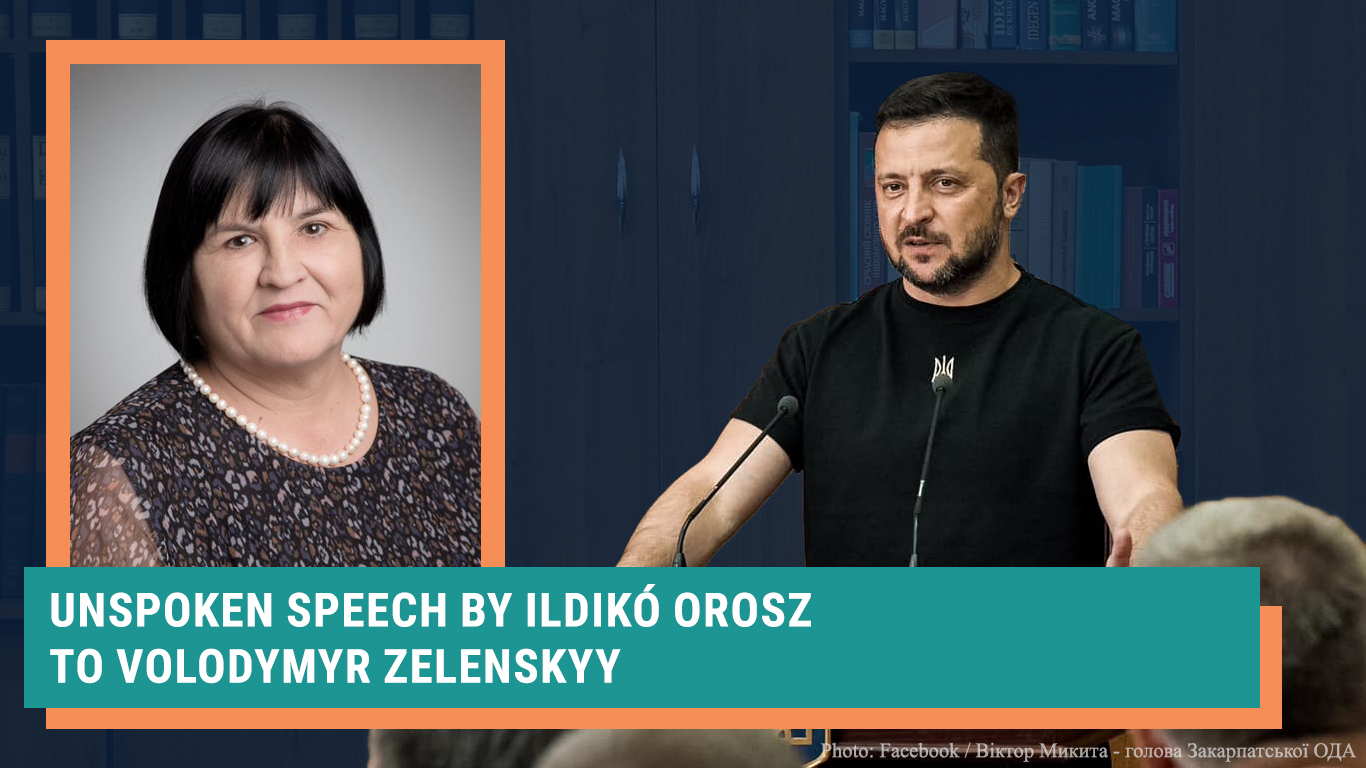Unspoken speech by Ildikó Orosz to Volodymyr Zelenskyy
On 2 August, the President of Ukraine, Volodymyr Zelenskyy visited Beregszász, where he met with representatives of the Hungarian minority in Transcarpathia, including Ildiko Orosz, President of the Rakoczi College of Higher Education. During the short meeting, the President of our institution was not given the opportunity to speak, but she managed to give the President a written version of her speech and a study on the situation of the minority, including suggestions, as well as the published works of the College and the KMPSZ on the situation of the minority in Ukraine. Below is Ildiko Orosz’s unspoken speech.
Dear Mr. President!
I welcome you to Transcarpathia as a delegate of the Transcarpathian Hungarian Cultural Association to the Transcarpathian Regional Council. It is an honour for me to represent the Ferenc Rakoczi II Transcarpathian Hungarian College of Higher Education, as well as the teachers of Hungarian-language schools.
Our community, like all communities in the region, has done its best on its own front since the first day of Russian aggression. We have taken in refugees and our teachers and students have continued to provide assistance and interpretation at the borders and in the various rest camps, and we have also played an active role in the organization of the National Multidisciplinary Test in Hungary.
As a teacher and now a sixth time re-elected member of the Transcarpathian Regional Council, I have always worked in the Committee on Education and National Minorities. As a result, I am well acquainted with the opinions, positions and problems of the national minorities of our region, especially in the field of education and the use of languages in public life.
On behalf of the national minorities of the county, I would like to thank you for postponing the implementation of Article 7 of the Law of Ukraine on Education for one year. However, it is important to stress that this measure does not provide a definitive solution to the existing problem. The educational rights of national minorities in our region are still restricted. The right to choose the language of education in our county, guaranteed by every governing authority to which we belonged, is now limited by the current education law, despite having a 150-year tradition.
Our colleagues, the teachers of the region, have repeatedly drawn attention to this problem, and have repeatedly proposed solutions. Please accept these ideas from us, which we have already presented in our previous studies, and I will take this opportunity to briefly present the essence of the studies, what we would like to see and how we could make it happen.
Last week I attended a forum on the education of national minorities in the European Union, where I learned about the new laws on public education and higher education in Romania, which provide national minorities with all the rights that we would ultimately be satisfied with.
According to the new law, Romanian will be taught as a state language in institutions of education for national minorities, using the methodology of teaching foreign languages. The specialized ministry will initiate a separate national program to assist minority students in acquiring the state language. The law also guarantees the operation of scattered schools and mandates the provision of all necessary resources even if the number of students does not reach 300.
The legislators also took into account the interests of young people from national minorities who wish to continue their studies in higher education. When applying for university admission, students can use the language they studied at secondary school, with the exception of courses related to national security. In fields of study where there is no higher education in a minority language, students from national minorities receive a special quota.
Thus, after Slovakia, Hungary, and Serbia, the situation of minority-language education has been resolved in Romania as well. Ukraine continues to remain an outsider in these events. It is time to settle this issue and for our legislators to think about amending the Law on Education in Ukraine or the Law on National Minorities and Communities, similar to the amendments that have been made in Hungary before. Hungary, in its Law on National Minorities adopted in 2011, listed the officially recognised national minorities in Hungary, including Ukrainians, giving them the right to establish their own mother tongue education system with state funding and to delegate a representative or spokesperson of their choice to parliament.
We, the national minority communities of the region, want nothing more than what the Ukrainian people have been struggling for centuries: to learn in our mother tongue in the land where we have lived for more than a millennium. Therefore, we ask you to solve this problem, which is a source of international conflict for our country.
The representatives of the national minorities in our region – Hungarians, Romanians, Slovaks – are fighting and dying on the front line for Ukraine, and they want nothing more than for them, their children and their families to have the opportunity to live, speak and learn in their mother tongue in Ukraine.
I wish us all a peaceful sky over our heads.
Beregszász, 02.08.2023.
Ildikó Orosz
-
This article is also available in
Українська
Magyar

